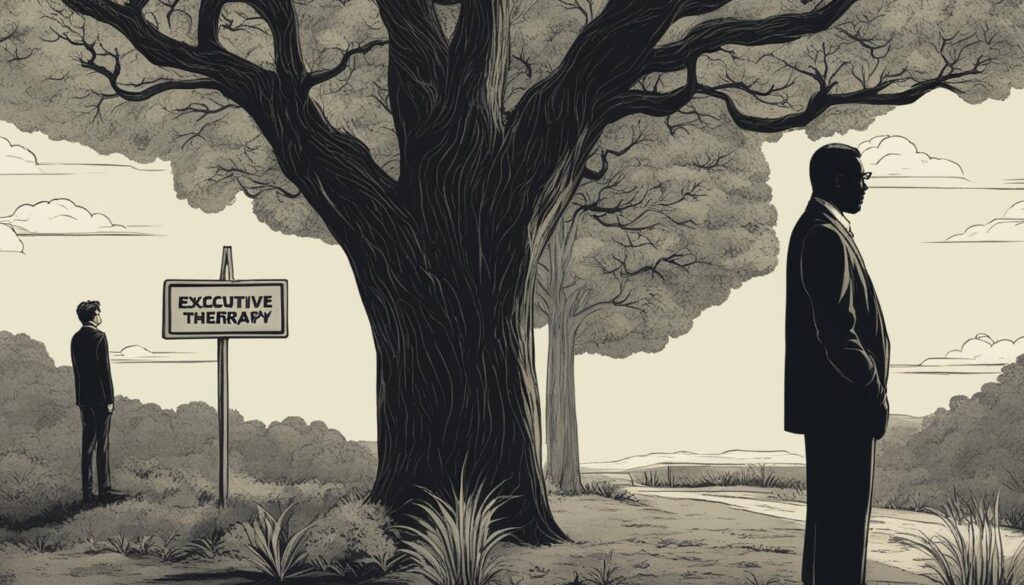Welcome to our ultimate guide on how to find an executive coach who can help you reach new heights in your career. As a leader, finding the right coach is essential for your success. Whether you’re looking for executive coaching services or searching through a coach directory, we’ve got you covered. In this comprehensive guide, we’ll provide you with step-by-step instructions to ensure you find the perfect executive coach who can assist in steering your career towards success.
Key Takeaways:
- Understanding the different types of coaching is crucial when searching for an executive coach.
- Evaluating qualifications and compatibility will help you choose the right coach for your specific needs.
- An executive coach can provide personalized guidance to enhance your leadership skills and help you achieve professional goals.
- Consider factors such as coaching approach, qualifications, and budget when selecting an executive coach.
- Executive coaching is not a substitute for therapy and should not be used to address mental health issues.
What is Executive Coaching?
Executive coaching is a process that involves unlocking an individual’s potential to maximize their own performance. It is a partnership between a coach and a client, where the coach helps the client achieve their specific objectives. This type of coaching focuses on the development of leadership skills and competencies. The International Coaching Federation defines it as a thought-provoking and creative process that inspires individuals to maximize their personal and professional potential.
Executive coaching involves a structured approach to help individuals gain self-awareness, develop new insights, and overcome challenges. It is a collaborative process that empowers clients to set goals and take action to achieve them. Through coaching, individuals can enhance their decision-making abilities, improve their communication and interpersonal skills, and ultimately achieve their professional goals.

| Benefits of Executive Coaching | Coaching Process |
|---|---|
|
|
“Executive coaching is a powerful tool that can help individuals unlock their full potential and achieve success in their leadership journey.”
What is Executive Coaching?
Executive coaching is a process that involves unlocking an individual’s potential to maximize their own performance. It is a partnership between a coach and a client, where the coach helps the client achieve their specific objectives. This type of coaching focuses on the development of leadership skills and competencies. The International Coaching Federation defines it as a thought-provoking and creative process that inspires individuals to maximize their personal and professional potential.
Executive coaching involves a structured approach to help individuals gain self-awareness, develop new insights, and overcome challenges. It is a collaborative process that empowers clients to set goals and take action to achieve them. Through coaching, individuals can enhance their decision-making abilities, improve their communication and interpersonal skills, and ultimately achieve their professional goals.

| Benefits of Executive Coaching | Coaching Process |
|---|---|
|
|
“Executive coaching is a powerful tool that can help individuals unlock their full potential and achieve success in their leadership journey.”
How Can an Executive Coach Help You?
An executive coach can provide you with numerous benefits, including leadership development and personal growth. By working with an executive coach, you can gain valuable insights, overcome challenges, and achieve your professional goals. Here are some key ways in which an executive coach can help you:
- Enhancing Leadership Skills: An executive coach can assist you in developing and refining your leadership skills. They can help you identify your strengths, address any areas for improvement, and provide guidance on effective leadership strategies.
- Improving Decision-Making Abilities: Executive coaching can enhance your decision-making abilities by helping you develop a clear decision-making process and providing objective perspectives. Through coaching, you can learn to make informed decisions that align with your goals and values.
- Enhancing Communication and Interpersonal Skills: Communication is crucial for effective leadership. An executive coach can help you improve your communication and interpersonal skills, enabling you to build stronger relationships with your team, colleagues, and stakeholders.
- Achieving Professional Goals: An executive coach can work with you to set clear goals and develop a plan to achieve them. They can provide you with support, accountability, and guidance throughout the process, helping you stay focused and motivated.
Overall, an executive coach can serve as a valuable partner in your professional development journey. They can provide you with personalized support, challenge you to grow, and help you unlock your full potential as a leader.

Testimonial
“Working with an executive coach has been a game-changer for me. My coach helped me gain clarity on my leadership style and provided practical strategies for improving my effectiveness. Through our coaching sessions, I have grown both personally and professionally, and I am now better equipped to lead my team towards success.” – Sarah, CEO
Different Types of Coaching
When it comes to executive coaching, there are various types that cater to different needs and goals. Understanding these different types can help you choose the right coaching approach for your specific situation.
Business Coaching
Business coaching focuses on helping individuals grow and develop their businesses. Whether you’re a small business owner or an executive in a large corporation, business coaching can provide you with insights, strategies, and support to navigate the challenges and achieve your business goals.
Leadership Coaching
Leadership coaching is designed to enhance leadership skills and competencies. Whether you’re a new leader looking to develop your leadership abilities or an experienced executive wanting to refine your leadership style, leadership coaching can help you become a more effective and impactful leader.
Performance Coaching
Performance coaching is aimed at helping individuals reach their full potential and achieve peak performance. Whether you’re struggling with performance issues or simply want to take your performance to the next level, performance coaching can provide you with the tools and techniques to maximize your abilities and excel in your role.
Developmental Coaching
Developmental coaching focuses on transforming a leader’s capacity to respond to various situations. It aims to help leaders develop new perspectives, insights, and behaviors that enable them to adapt to changing circumstances and become more agile and effective in their roles.
Career Coaching
Career coaching is specifically targeted towards individuals who are looking to navigate career-related issues and transitions. Whether you’re considering a career change, seeking advancement opportunities, or looking to enhance your professional development, career coaching can provide you with the guidance, support, and strategies to achieve your career goals.

| Type of Coaching | Description |
|---|---|
| Business Coaching | Focuses on growing and developing businesses, providing insights and strategies. |
| Leadership Coaching | Enhances leadership skills and competencies, helping individuals become more effective leaders. |
| Performance Coaching | Aims to help individuals reach their full potential and achieve peak performance. |
| Developmental Coaching | Focuses on transforming a leader’s capacity to respond to various situations. |
| Career Coaching | Targets career-related issues and transitions, offering guidance and support for career goals. |
These different types of coaching provide specialized support to address specific needs and objectives. By understanding the distinctions between them, you can choose the coaching approach that aligns best with your goals and aspirations.
The Difference Between Executive Coaching and Mentoring
When it comes to personal and professional development, two commonly used terms are coaching and mentoring. While they may seem similar, there are significant differences between the two approaches. Understanding these distinctions can help you determine which path is best suited to your needs and goals.
Coaching is a non-directive process that focuses on helping individuals unlock their potential through self-discovery and self-reflection. It is a partnership between the coach and the client, where the coach asks powerful questions and provides guidance to facilitate personal growth and skill development. Coaching is typically goal-oriented and focuses on helping individuals gain clarity, set actionable goals, and develop strategies to achieve them.
“Coaching is unlocking a person’s potential to maximize their growth.”
-John Whitmore-
Mentoring, on the other hand, involves a more directive approach. A mentor is a more experienced individual who shares their knowledge, expertise, and advice with a less experienced individual. Mentors often provide guidance based on their own experiences and help mentees navigate specific challenges or situations. Unlike coaching, mentoring is typically more focused on passing down knowledge and offering advice rather than facilitating self-discovery and personal growth.
Both coaching and mentoring have their benefits and can contribute to personal and professional development. However, coaching tends to be more suited for individuals seeking to unlock their potential, gain self-awareness, and develop new skills. Mentoring, on the other hand, is beneficial for individuals looking to learn from someone with specific expertise and experience in their field.
| Coaching | Mentoring |
|---|---|
| Non-directive | Directive |
| Focus on self-discovery | Focus on knowledge sharing |
| Goal-oriented approach | Experience-based guidance |
| Facilitates personal growth and skill development | Shares expertise and advice |
Ultimately, the choice between coaching and mentoring depends on your specific needs and goals. If you are seeking personal growth, skill development, and clarity in achieving your objectives, executive coaching may be the ideal path for you. On the other hand, if you are looking to tap into the knowledge and experience of someone in your field, mentoring may provide the guidance you need. Consider your goals, preferences, and learning style to determine which approach will best support your journey of growth and development.
Should You Look for a Mentor Instead?
While executive coaching offers numerous benefits for personal and professional growth, you may wonder if seeking a mentor is a better option. Mentors can provide valuable advice, share their experiences, and help you navigate challenges based on their own knowledge and expertise. However, it is important to consider your specific needs and goals before making a decision. Here are some key factors to consider when weighing the benefits of mentorship versus coaching:
The Benefits of Mentorship
- Mentors can offer industry-specific insights and guidance based on their own experiences.
- They can provide valuable networking opportunities and introductions to key contacts in your field.
- Mentorship can help you gain a deeper understanding of your industry and its best practices.
- Mentors can offer ongoing support and advice as you navigate your career.
Mentorship vs Coaching
Mentorship differs from coaching in that it tends to be a more informal relationship, based on mutual trust and respect. While mentors can provide valuable guidance, they may not have the same level of expertise in coaching techniques and methodologies as professional executive coaches.
Coaching, on the other hand, offers a more structured and focused approach to personal and professional development. Coaches can help you set specific goals, develop new insights, and provide support and accountability throughout the coaching process. They can also offer a broader perspective and help you identify blind spots that may be hindering your progress.
Consider Your Needs and Goals
Ultimately, the decision to seek a mentor or an executive coach depends on your individual needs and goals. If you are looking for industry-specific guidance and the opportunity to learn from someone with firsthand experience, a mentor may be the right choice for you. However, if you are seeking a more structured approach to personal and professional growth, with a focus on developing specific skills and achieving measurable results, executive coaching may be the better option.
Remember, there is no one-size-fits-all solution. It’s important to carefully consider your own goals and preferences when deciding whether to seek a mentor or an executive coach. In some cases, a combination of both may provide the best of both worlds, allowing you to benefit from the mentor’s wisdom and the coach’s expertise.

What About a Therapist?
When considering personal growth and support, it’s important to understand the differences between therapy and coaching. While therapists are trained to help individuals facing mental health challenges, coaches focus on personal and professional growth. Coaches are not mental health professionals and do not provide therapy for mental illnesses. If you are dealing with mental health issues, it is important to seek the appropriate professional help.
However, if you are looking for support and guidance in achieving your personal and professional goals, executive coaching can be an excellent choice. Coaching provides a structured and focused approach to help you unlock your full potential. Coaches can assist you in setting goals, developing new insights, and providing support throughout the coaching process.
Coaching is particularly beneficial for personal growth, skill development, and leadership enhancement. By partnering with an executive coach, you can work towards achieving your goals and building the necessary skills to succeed in your professional journey.
“Coaching is unlocking a person’s potential to maximize their own performance. It is helping them to learn rather than teaching them.” – Timothy Gallwey
Remember, when it comes to therapy versus coaching, it’s essential to understand your needs and goals. If you require mental health support, seeking a qualified therapist is the appropriate course of action. However, if you are seeking personal growth and professional development, an executive coach can provide the guidance and support you need.

How to Find an Executive Coach
Finding the right executive coach requires careful consideration. To start, you can ask for referrals from your network or explore coaching directories. Referrals from trusted sources can provide valuable insights and recommendations. Additionally, coaching directories can help you browse through a wide range of coach profiles and find professionals with expertise in your specific industry or area of focus.
Once you have a list of potential coaches, you can conduct interviews and chemistry calls to assess their fit with your goals and learning style. Use this opportunity to ask about their coaching approach, methodologies, and previous experience working with clients in similar situations. Chemistry calls are a chance to gauge how well you connect with the coach on a personal level, as a strong rapport is crucial for a successful coaching relationship.
When evaluating coach qualifications, consider factors such as certifications, credentials, and industry experience. Look for coaches who have completed recognized coaching programs or hold certifications from reputable coaching organizations. Additionally, assess their commitment to ongoing professional development and staying up-to-date with the latest coaching techniques and best practices.
Choosing the Right Coach
Trust and compatibility are also crucial in selecting an executive coach. You should feel comfortable sharing your goals, challenges, and vulnerabilities with your coach, as they will be your trusted partner throughout the coaching journey. Take the time to reflect on whether the coach’s values and coaching approach align with your own. Additionally, consider their availability and the level of support they offer between coaching sessions.
| Coach Selection Process | Coach Qualifications |
|---|---|
|
|

“Finding the right executive coach is like finding the perfect puzzle piece that completes your picture of success. Take the time to explore your options, ask the right questions, and trust your instincts. With the right coach by your side, you can unlock your true potential and achieve greatness.”
– Anonymous
Cost of Executive Coaching
When it comes to executive coaching, the cost can vary depending on several factors. The experience and credentials of the coach, the duration and frequency of the coaching sessions, and the level of customization required all play a role in determining the price. On average, coaches charge anywhere from $150 to $3000+ per hour.
It’s important to consider executive coaching as an investment in your personal and professional development. Many individuals and companies find the value provided by a skilled executive coach to be well worth the cost. By working with a coach, you can gain valuable insights and guidance that can propel your career and leadership abilities to new heights.
“Coaching is an investment in yourself, your growth, your development, your commitment to living a life that you design.” – Suzanne Mercier, Executive Coach
The ROI of Executive Coaching
While the cost of executive coaching may seem high, it’s important to consider the return on investment (ROI) that it can generate. By investing in yourself and your development as a leader, you can unlock new opportunities, improve your decision-making abilities, and increase your overall effectiveness in the workplace. Many individuals who have gone through executive coaching report experiencing significant growth and success in their careers.
It’s important to budget for executive coaching and consider it as a strategic investment. If you’re unsure about the financial aspect, explore potential funding options within your organization. Some companies offer executive coaching as part of their professional development programs, so take advantage of these resources if they are available to you.
Conclusion
When considering the cost of executive coaching, it’s important to remember that it is an investment in your personal and professional growth. The benefits and opportunities that can arise from working with a skilled executive coach often far outweigh the financial commitment. Take the time to budget and plan for executive coaching, and explore funding options if necessary. With the right coach by your side, you can experience significant growth and success in your leadership journey.
Conclusion
Finding the right executive coach is a crucial step in achieving your professional goals and personal growth. By following the steps outlined in this guide, you can navigate the process with confidence and find a coach who aligns with your needs and goals.
Remember to consider factors such as coaching approach, qualifications, compatibility, and budget as you make your decision. With the right coach by your side, you can unlock your full potential and achieve success in your leadership journey.
So, take the time to research and evaluate different coaches, ask for referrals, and conduct interviews to ensure you find the perfect fit. Investing in executive coaching can have a profound impact on your career and personal development, so choose wisely and embark on this transformative journey towards success!
FAQ
What is executive coaching?
Executive coaching is a process that involves unlocking an individual’s potential to maximize their own performance. It is a partnership between a coach and a client, where the coach helps the client achieve their specific objectives.
How can an executive coach help you?
An executive coach can provide you with personalized guidance and support to help you enhance your leadership skills and reach your full potential. They can help you gain self-awareness, develop new insights, and overcome challenges.
What are the different types of coaching?
The different types of coaching include business coaching, leadership coaching, performance coaching, developmental coaching, and career coaching. Each type focuses on specific areas of personal and professional growth.
What is the difference between executive coaching and mentoring?
Coaching is a more non-directive process that focuses on helping individuals unlock their potential through self-discovery. Mentoring, on the other hand, involves a more directive approach, where a more experienced individual passes down their knowledge and advice to a less experienced individual.
Should I look for a mentor instead of an executive coach?
Whether you should look for a mentor or an executive coach depends on your specific needs and goals. Mentors can offer valuable advice, share their experiences, and help you navigate challenges based on their own knowledge and expertise. However, coaching provides a more structured and focused approach to personal and professional development.
Can an executive coach provide therapy for mental health issues?
No, coaches are not mental health professionals and do not provide therapy for mental illnesses. If you are dealing with mental health issues, it is important to seek the appropriate professional help. However, if you are looking for support and guidance in achieving your personal and professional goals, executive coaching can be an excellent choice.
How do I find the right executive coach?
To find the right executive coach, you can ask for referrals from your network or explore coaching directories. Once you have a list of potential coaches, you can conduct interviews and chemistry calls to assess their fit with your goals and learning style. Trust and compatibility are crucial factors in selecting an executive coach.
How much does executive coaching cost?
The cost of executive coaching can vary depending on factors such as the experience and credentials of the coach, the duration and frequency of the coaching sessions, and the level of customization required. Coaches may charge anywhere from $150 to $3000+ per hour. It is important to budget for coaching and consider it as an investment in your personal and professional development.
What is the importance of finding the right executive coach?
Finding the right executive coach is crucial in achieving your professional goals and personal growth. With the right coach by your side, you can unlock your full potential, enhance your leadership skills, and achieve success in your leadership journey.
